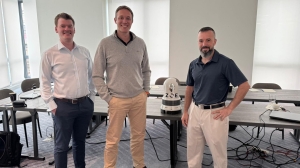


(Posted on 31/01/25)
Commander Matt Mitchell, a former USCG Officer, is determined to make sure all Search and Rescue authorities worldwide adopt Zelim’s ZOE Intelligent Detection system to save more lives at sea. Founded in 2017 by former seafarers, Zelim provides smart technology for maritime search, rescue and security operations.
For those tasked with search and rescue operations around the world, the sobering reality is that current technologies are not up to the task. The use of older sensor technologies, inconsistencies in human searching, and a lack of fully integrated planning tools have all contributed to a grim statistic - as few as 19% of search and rescue responses involving persons in the water result in a life saved.
It's a problem that has plagued the maritime industry for decades, says Matthew Mitchell, a former US Coast Guard officer. "The core challenge we face is that search and rescue authorities simply don't have the tools to detect and track persons in the water effectively," he says.
During his 20-year career with the US Coast Guard, Mitchell oversaw the development of the service's search and rescue planning systems. This role gave him a unique perspective on the industry's longstanding struggles.
"Out of the 20 different sensor types used by the Coast Guard today, we can only reliably integrate three of them into effective search plans," he says. "The performance of new sensor technology in different environments, with different search objects, is just not well understood."
This lack of knowledge about sensor capabilities is compounded by the inherent variability of the human observer, which remains the primary means of detecting people in the water during search and rescue operations.
"We've poured millions into studying the capabilities of the human eye, but it's still an inconsistent and unreliable tool," Mitchell laments. "When you couple that with the challenges of operating in rough seas, with poor visibility, and other harsh conditions, you end up with a recipe for disaster."
The tragic consequences of these limitations are borne out in real-world incidents. Mitchell cites the tragic incident in March 2009 when a four-person crew whose small fishing boat capsized 70 miles off the US coast. All four were wearing flotation devices.
"Rescue teams flew over them numerous times, but they couldn't detect the survivors in the water," he recounts. "Three of the four people ended up perishing, with only one survivor left to tell the harrowing tale."
Stories like this drove Mitchell to leave the US Coast Guard and join forces with Zelim, a company he had first encountered years earlier at a maritime safety conference in the UK.
Mitchell, who now serves as the Director of Search and Rescue for Zelim's US and Asia-Pacific operations, believes that the widespread adoption of Zelim’s AI-powered ZOE detection and tracking system will completely change the way persons in water are detected, ultimately saving more lives at sea.
"I was immediately impressed by the passion and vision of Zelim's founders, Sam Mayall and Doug Lothian, as well as the calibre of the team they were assembling," he recalls. "And when I learned about their breakthrough technology, ZOE, I knew I had to be a part of it."
ZOE is an AI-powered detection system representing a quantum leap forward in man overboard monitoring and response. Unlike traditional sensor systems that rely on the human observer, the Zelim technology utilizes advanced computer vision and machine learning algorithms to continuously scan the water around a vessel, instantly detecting signs of a person in distress. It differentiates persons in water from other objects, such as seabirds, buoys, small craft, reflections on the water, flotsam, and jetsam.
"ZOE doesn't get tired, it doesn't get distracted, and it doesn't have the inherent variability of a human searcher," Mitchell explains. "It can detect a person in the water with pinpoint accuracy, even in challenging conditions like rough seas or when visibility is poor. And crucially, it can do this 24/7, providing a constant vigilance that isn't possible with other systems that rely on human-in-the-loop observation."
Shipowners and managers are being reminded to review onboard fuel-measurement and data-capture practices... Read more
Cavotec has signed another contract with Australian construction and engineering company Civmec for... Read more
As announced in April 2025, Samuel Schär has assumed his position as CEO of Bühler, effective... Read more
Leading vessel performance platform Smart Ship Hub says the industry should expect a breakthrough year... Read more
The Nordic countries are taking an important step towards decarbonising maritime transport with the... Read more
Germany’s Steelpaint has appointed ADD Marine as its representative for Greece and Cyprus, strengthening... Read more
Rio Tinto’s first Pilbara-made iron ore rail car has rolled off the production line in Karratha... Read more
Precision meets progress at Phu My Port, Vietnam. The LPS 550 has been deployed to handle bulk commodities... Read more
bound4blue, a global leader in wind propulsion systems, has expanded its industrial footprint in Asia... Read more
As the industry explores multiple decarbonisation pathways, methanol is gaining attention as a practical... Read more